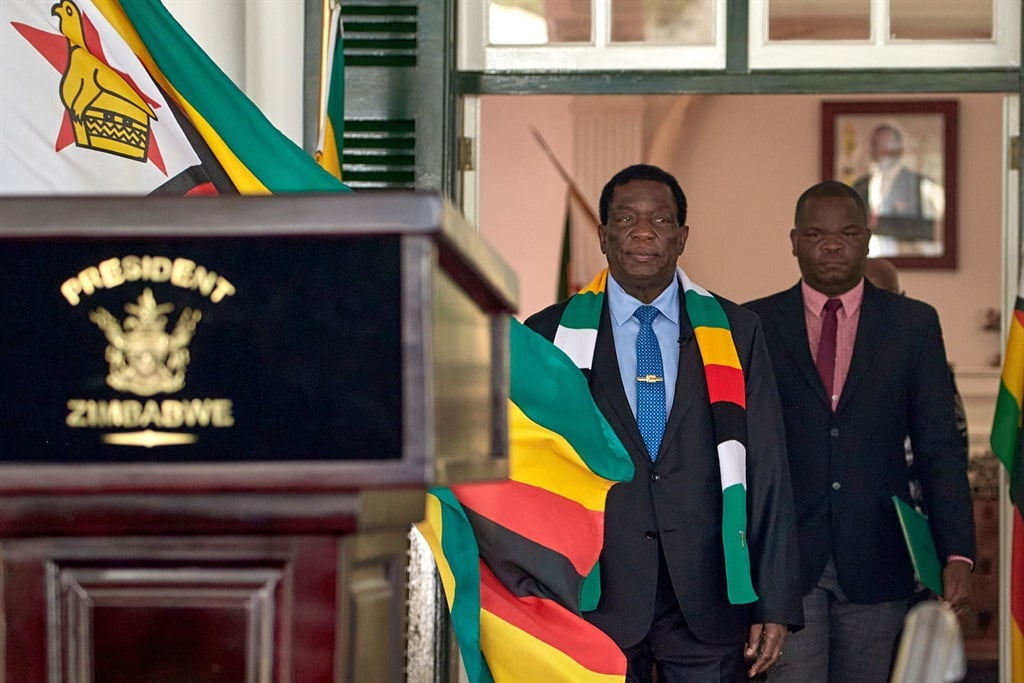

Amidst calls for national protests over election outcomes, Zimbabwean President Emmerson Mnangagwa has began planning for his second inauguration.
Jekesai Njikizana/AFP
- Zimbabwean President Emmerson Mnangagwa has started planning for his second inauguration.
- News24 understands the event is due to take place in the middle of next week.
- But the opposition may be able to influence that timeline.
Invites will soon start going out to regional and international heads of state for Zimbabwean President Emmerson Mnangagwa’s inauguration for a second term.
While the date is yet to be made public, government sources told News24 the ceremony would take place in the middle of next week – if there were no hurdles put up by the opposition.
From the day of the results announcement, the opposition had seven days to file a court challenge.
By Friday, it had not done so, meaning that by Sunday, if there’s no challenge, Mnangagwa can go ahead with his inauguration.
If the opposition decides to challenge, it will have to submit a thorough report to the Southern African Development Community (SADC), explaining why it believes the results are invalid.
READ | Zimbabwe opposition calls for protests – a day after Mnangagwa threatens jail for ‘chaos’ spreaders
On Friday, the Citizens Coalition for Change (CCC) called for national protests against the election outcome.
On Wednesday, at a victory rally in Buhera – a district in Manicaland – the president-elect said the Zimbabwe Electoral Commission (ZEC) had stood its ground against a flurry of attacks from hostile nations during the election process.
“They (ZEC) stood steadfastly and resolutely, guided by the laws they are armed with,” he said.
Zanu-PF’s Mnangagwa won his second and last constitutional term, with 52.6%, against his main rival, Nelson Chamisa of the CCC, in an election with many irregularities.
Numerous international observers, including the more influential SADC Electoral Observation Mission to Zimbabwe in their preliminary report, concluded that the election was neither free nor fair.
Larry Garber, a consultant with Just Security on international development, democratic elections, and human rights, said the SADC was a surprise critic of Zanu-PF.
“Such overt criticism of a fellow SADC member was unprecedented,” he said.
Speaking at a webinar organised by the Southern African Political Economy Series (SAPES) to review the election outcome, were British academic Dr Steven Chan, Zimbabwean public policy analyst Dr Ibbo Mandaza, disqualified presidential candidate Saviour Kasukuwere, politician Robert Chapman, and Dr Chipo Dendere.
They unanimously agreed that the country needed a multi-stakeholder transitional authority.
But polarisation and political contestations still stood in the way of what could be the best solution for the country.
ALSO READ | IN-DEPTH: Zimbabwe elections: SA’s response legitimises an ‘authoritarian regime’
Mandaza and Tony Reeler, a senior researcher at the Research and Advocacy Unit and co-convener of the Platform for Concerned Citizens, launched a petition to the SADC which by midday Friday had 13 000 signatures, close to the required 15 000 to get the attention of the SADC Organ on Politics, Defence and Security.
In the petition, they call for the establishment of “an Eminent Persons Group, tasked with negotiating the establishment of a Transitional Government, composed of political parties and other major citizen groupings”.
They added that “negotiations must be broad-based, including political parties, civil society, churches, labour, women, and other citizen groupings”.
The News24 Africa Desk is supported by the Hanns Seidel Foundation. The stories produced through the Africa Desk and the opinions and statements that may be contained herein do not reflect those of the Hanns Seidel Foundation.
